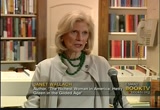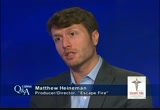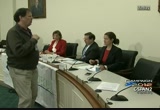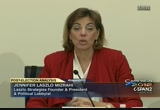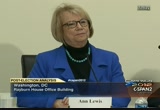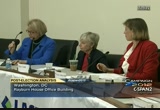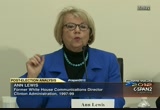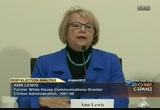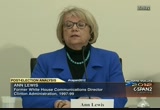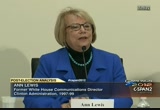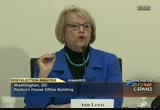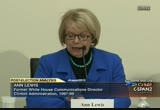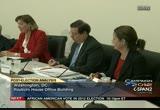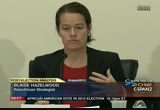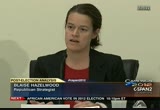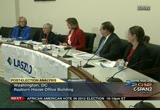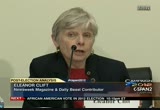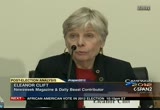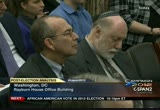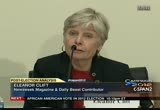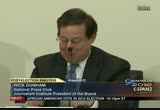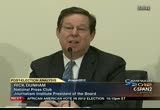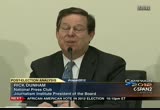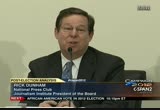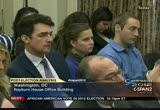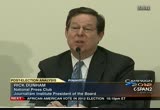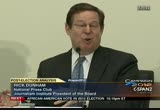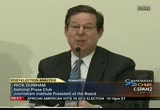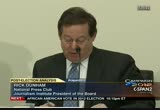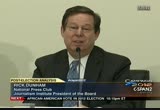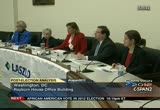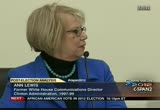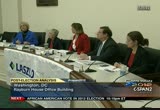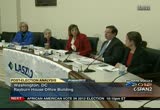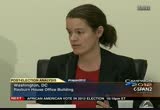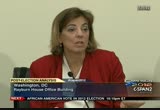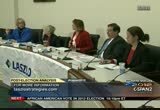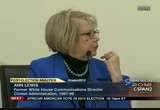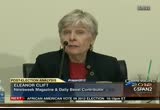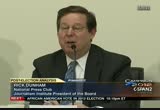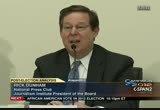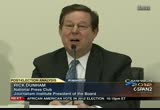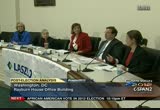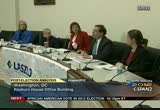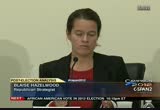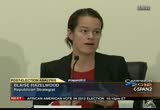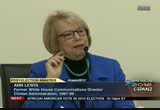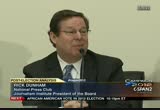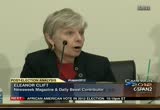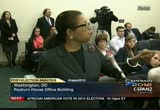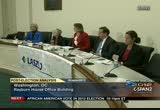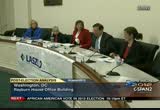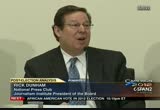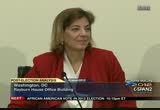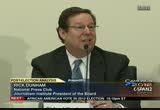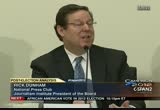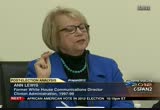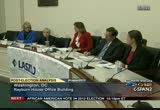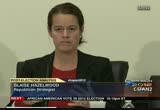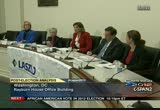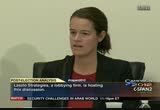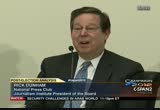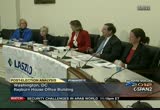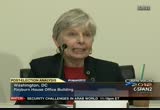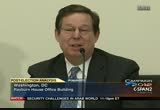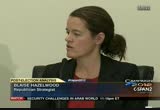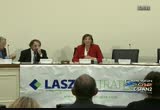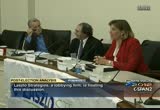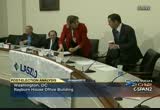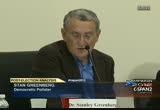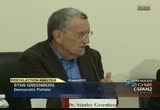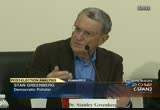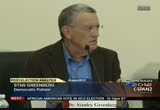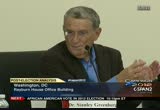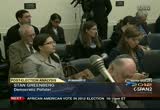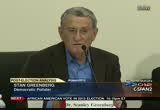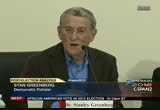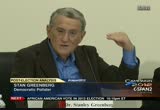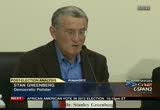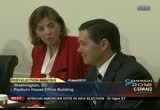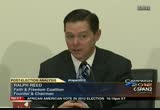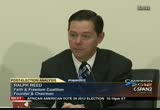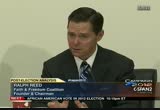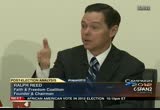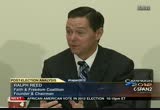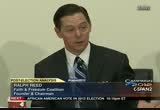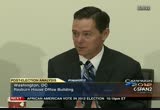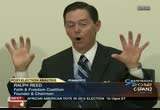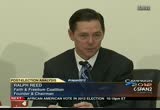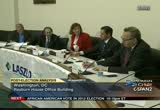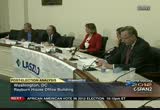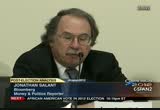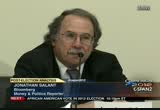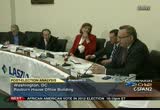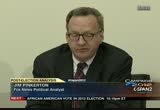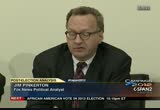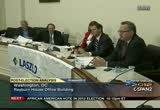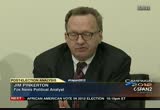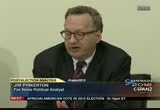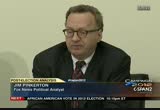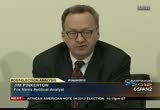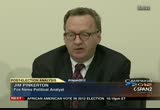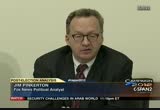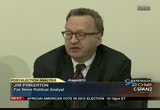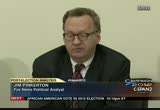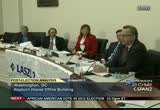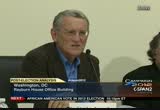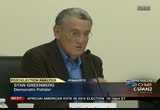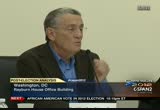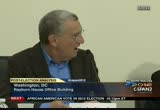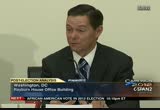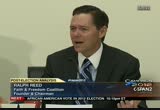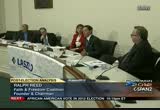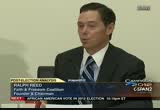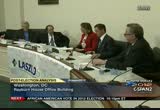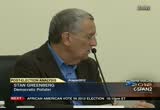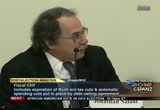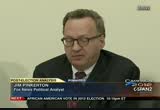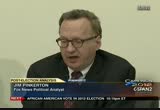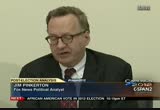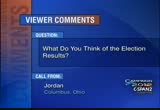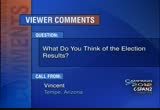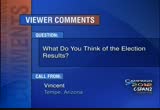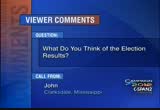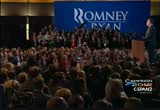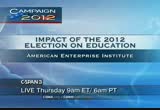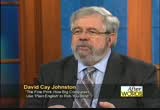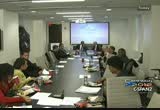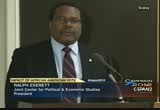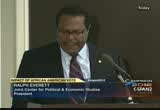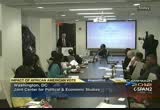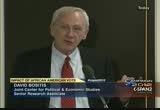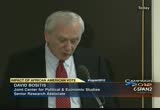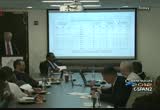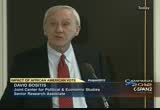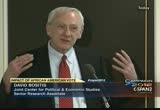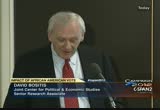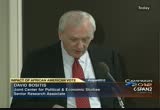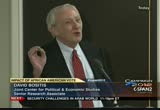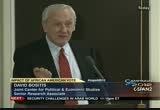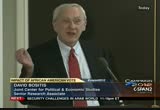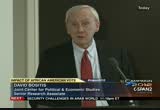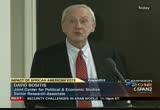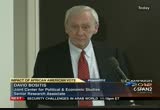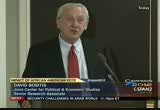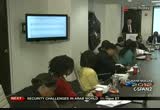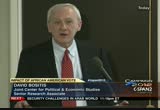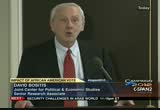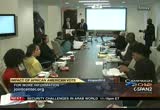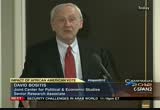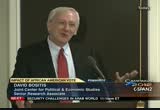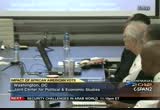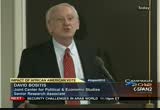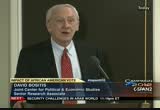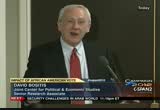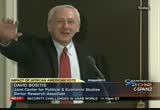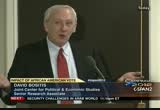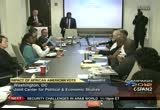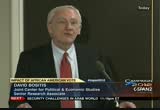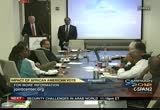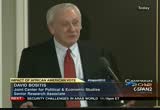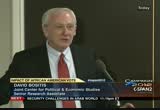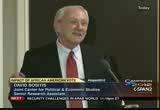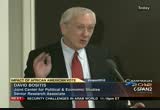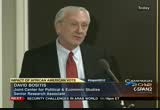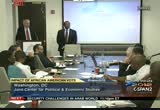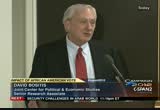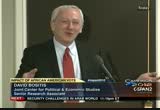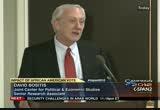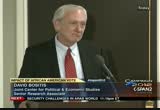tv Tonight From Washington CSPAN November 7, 2012 8:00pm-11:00pm EST
8:00 pm
the headlines were really negative, but the reporters who spent time with her really appreciated her, admired her, enjoyed her company so that was rewarding to see that. the stories are sipped kateed all over the united states and all over the world. yes? >> how long did it take you to -- >> about five years, yeah. well, thank you. [applause]
8:01 pm
>> i need help here. >> did he try to get up without anybody knowing? >> he just rolled himself out. >> oh, here you go, the morphine. >> he was issued this bottle today. he's taken ten tablets. >> oh, my god. that is ridiculous. that's why he's a little high right now. >> at some point, he could stop breathing if you take too much narcotics. doing cpr on a patient. >> sergeant robert yates today so we ended up following him after this plane ride, for many months as i said, and he ended up injurying himself into an innovative program using acupuncture and meditation and
8:02 pm
other techniques to wean him off all the drugs he was on, and through this program, he actually was able to walk out of walter reid on his own two feet so, you know, i really commend the military for two things, for, one, allowing us to tell this story, both the good and the bad, but for recognizing this problem, by recognizing that there is this problem of over medication, and that they are looking for outside the block ideas on how to fix it. i mean, that's sort of the whole thesis of the film, really, the metaphor of the "escape fire" that the status quo is not working, and we have to look for outside the box ideas. >> more with the producer and directser of "escape fire" the fight to rescue america's health care sunday night at eight on c-span's "q&a." >> coverage continues with a forum hosted by the strategy
8:03 pm
firm laslow strategies. you'll hear from greenberg and ralph reed from the faith and freedom coalition. up first, the white house communications director, and daily beast contributor. this is two hours. >> good morning, and welcome. thank you, all, for being here. i'm jennifer laslow, founder and president of this organization, laslow strategies, an organization that does strategic communications, but we're not partisan, and i'm very, very hop norred and delighted to have -- honored and delighted to have a terrific panel to offer the audience here today. we have two audiences. we have a live add yens here inside the capital area, in the rayburn house office building in a hearing room of the foreign affairs committee. i'd like to thank congressman
8:04 pm
brad sherman for providing the room for us. he had a big upset win last night over congressman berman. i want to thank congressman berman for his service to america and congratulate all service people who ran for office whether they either won or lost last night. it's an incredible thing to have to serve or to be willing to serve. it's a paifl process to go through negative campaign, hard on the candidates and their families, and the voters owe a debt of gratitude to those willing to serve, whether they win or lose. i've picked a very distinguished panel of folks to talk today from left to right. to try to make it convenient for you, i've seated them in a way that i think is approximately from your left to right. on my right, your left, i'm going to start with our first speaker, but the way i'm going to do it is i'm going to briefly introduce each speaker; then i'm going to ask them the same
8:05 pm
question, about what happened in the election and what it means, and they'll spend about five minutes, and we'll go on to the next speaker, and we're going to have an opportunity to do a lot of q&a. this is going to be, again, nonpartisan. we have both political parties represented, a wide range of views, and so you'll hear the broad spectrum. we'll start with ann lewis, a real mentor to me. she's a complete superstar in strategic communications, people know her as former white house communications director under president bill clinton and also the shining light behind the political operation of hillary clinton. let me start with ann lewis. >> thank you. answer your question; right? >> which is what happened and what's it mean for america. >> while they are still counts voting in florida -- [inaudible] >> [inaudible] >> it's not on?
8:06 pm
oh, there's a greener light. i apologize. [laughter] i saw the green light, too subtle for me, but i hope we're on now. here's what we know. we certainly know the president was re-elected, democrats picked up seats in the senate, which is contrary to what anybody in washington, i think, thought, even as late as labor day. we know the house is going to stay roughly the same. absent breaking news, i bring you no precinct returns from florida. i'd like to spend more time on why this is happened, and what that means for us going forward. first, i share the admiration all around for president obama's campaign team. they were tech nickically close to perfect in the first responsibility of a campaign team, that is to identify and turn out voters. they planned it. they executed it. every step of the way, they knew what votes they needed, got out and got them. they began weeks before election
8:07 pm
day banking favorable votes in states where they had already had people on the ground preplabbed to produce. again, technically, a superb operation, one to set the standard for future campaigns and now you identify your voters, encourage them to turn out, and perhaps some people think by the fourth or fifth visit or phone call verging on harassment to turn themçó out, t it worked. the point i want to make beyond that, however, because i think that technical aspects get a lot of attention, but i want to point out how much of this is actually policy based. the fact this election's ultimately are about policies, not just about campaign techniques. the first policy, of president obama's, the clearly had a huge impact, is the decision to go in there and rescue the american auto industry. that is to use government funds to keep an american industry going. an example of what, for democrats is an ongoing
8:08 pm
principle that government can be a force for good. it's not always the enemy. the rescue of the auto industry, very important, and clearly, throughout the midwest you saw it. the second policy that had direct electoral consequences was this decision to reach out to what we now call the dreamers. young people who had been brought to the country, perhaps by their parents, did not have the appropriate papers for citizenship, but were here. americans in every way and want to build a future. they were hoping to go to college, and the president's announcement of an executive decision to suspend deportation for young people in this category was a very strong signal he shared their hopes. he understood their aspirations. he welcomed them to america. very important, and as we see in the numbers from the his pappic -- hispanic community, again, understood and appreciated. the third is a cluster of issues
8:09 pm
around the question of women's health. will the affordable care act, itself, might still be unpopular, the provisions around care for women, health care for women, no more gender discrimination in payments, a series of preventative services like cancer screenings, like birth control are very popular, and so to the extent that republicans beginning with their nominee made it an issue they were going to roll back these protections, these provisions, they said to the women, we're not on your side. the auto industry, reaching out to the dreamers on women's health. there was a symbolic way of saying to people and real policy based way, we understand your lives. we wanted to helpful. the fourth piece, i'd say, is the issue of marriage which we said in maryland, equal marriage, saying the rights and responsibilities of marriage should be open to everyone, no matter who they are or who they love. i don't think we fully
8:10 pm
appreciate yet how important that issue is as a civil rights issue to young voters. when i look at youth turnout and the heavy margins that president obama got with young voters, i'd saying again, a smaller cluster of what they see as civil rights issues making college more affordable, marriage work there. bottom line, again, it may look to an outsider as not much changed. we still have president obama as president. we still have a democratic majority in the senate. we have a republican majority in the house. look at the different people now elected to congress. look not just at their faces, but their life experiences, and you will see, i think, a change that truly reflects the changes in america. in the senate -- in the senate, we have four new women senators. we have six incumbents, all of whom were re-elected, five challengers or five new candidates, four of the five
8:11 pm
were re-elected. in fact, if i step back and look at this election year as a whole, there were 33 senate seats up for election. one in three of the democrats nominees were women. in is a historic marker for a party, and as you can see, the voters liked it too. four new democratic women. on the republican side, for a series of reasons, the number of republican women in the senate has gone down by one. they had two retirements and one new candidate. i will continue to watch that, but i think the growing number of women in the senate is very important. reflected, by the way, the continuing number of women in the electorat. in 2008, something like 10 million were women who voted, and they gave president obama, i believe, a 13-point margin. i cannot say yet this morning what the time turnout will be in the election, but we know now that women have given president obama a 12-point margin.
8:12 pm
get a 12-point margin among the majority of the electorat, you're doing well. paying attention to the role of the women voters in this one, role of hispanic voters, role of young voters and their enthusiasm of the president, and then go back and look at the policies on which it was based, and the policies that inspire the turnout, and you have a better sense of what the election means, thank you. >> thank you, ann. i'm going to actually turn to the political right rather than going straight to eleanor. we'll go to blaze haze lwood, the superstar, the former republican national committee political director. she's also the president of grass roots targtsing, a microtargetting firm. i'll say her husband, dan hazelwood is one of the leading republican political consultants, both good friends of mine, and she's a working mom. a real testament to the world of
8:13 pm
women this is, i believe, the first panel that i've done on politics where we had so many of the panelists who are women and nobody is here for affirmative action. i assure you, it's a superstar panel. blaze? what happened on the republican side? >> well, my husband and i, we were talking about this last night, and i just, the first thought that occurred to me is this is campaign 101. that's the bottom line. the way i look at it is, you know, the first thing that happened is that the democrats, and i got to give the obama team, you know, great credit. they turned out the base. they did a fabulous job of it, and there's a lot we need to learn from them as republicans. the next thing is that negative works. we don't like it. everyone complains about it, but bottom line is it works. the obama team went in and defined romney early.
8:14 pm
they spent money in the summer going after him, and romney was not given a chance to define himself, and that works. again, campaign 101, and the last one is that you always have to rebut the negatives against you. i mean, again, it is fundmental part of campaigning, and romney let the romney campaign let that summer go unanswered, let all the bain attacks go on unanswer. on medicare, on the offensive immediately, and look where we are. we are pretty much in the same place with the house. the house campaigns negative early, and the results are very apparent that that, again,
8:15 pm
works. is just for the future, i -- i look at this again as, like, a learning experience. this is, you know, 2004 all over again. it just -- republicans are the one with the wakeup call this time instead of the democrats. those sides have changed, and we need to -- we need to look back at this election and, you know, again, review our turnout techniques and go from there. >> thank you, blaise. electorat nor, distinguished writer, published many books, contribute to ""newsweek" magazine and daily beast website and a guest on the syndicated talk show. what's going on from your perspective and what's it mean to america. >> first of all, my chair is lower than the two ladies on the right and left. >> that is true. >> i'm ten feet tall from my perspective today so i can handle it. >> that's really fun.
8:16 pm
[laughter] >> it was a good night for democrats, for women, for pot smokers, for the new emerging electorat, and this is not your grandfather's electorat. ronald reagan ran in a very different america. ronald reagan would have a difficult time in today's republican primary process. there are lessons on the republican side and democratic side that are not as tech any, and those less sons can be learned easily. it's the remaking of the party's approach, if they can't be in the national party if they turn off african-americans, his hispanics, and now women. the republican party, today, is 90% white, and the democratic party, i understand, the caucus that returns to washington, will
8:17 pm
be 50% majority, 50% or, i guess, majority minority and women, and when we look at the state of the union, next year, that divide so apparent with republicans on one side, democrats on the other, and the overwhelming white maleness of the republican party comes through, and they're, you know, i love white males. i gave birth to three of them, but there are enough of them to keep the republican party allye, and i should add a a footnote, my three sons are not contributing to the republican party either. there are lessons here. they will have to go through rethinking, and there's lessons for president obama as well. there was a near death experience after the first debate seeing his political mortality, and if there was any,
8:18 pm
i think a word i hear from the republican friends were that he's, you know, this celebrity and he can coast. i think that has been purged from him, and i think he understands, i mean, he won in large part because of the auto bailout which was a courageous decision. i think opposition to it was overwhelming. he did it, it succeeded. it was bold, it was clear. we need that decision and leadership. i think he needs to be mindful to tell the story along the way. however superb the campaign was, the white house team was terrible in message making in the presidency losing the health care debate, tea party filled a void, and that cost them the house in 2010, and it's going to probably be a long time before
8:19 pm
they get the house back because of redistricting and all of that. that's the one sour note for democrats coming out of the election is what to do about the house, and is there a way back to the majority? there's going to be some probably rethinking on their approach to the leadership. i'd like to see them name governor romney to a post. you know, the bully pulpit for business america, bolstering business. i think it would send the right message, and i thought governor romney's concession speech last night was classy, and i think that's probably who he is, but he doesn't run alone, but with the party, and i think he, alone, could not change his party even if he was elected,
8:20 pm
and so i think i would like to see governor romney have some sort of prominent role. i know there's bad blood between the two, but there's gamesmanship in politics. if you're the win e you can afford to be generous, and president-elect obama reached out to hillary clinton after a very bitter primary fight, and look at all the good from that. that's my wish for the future. >> thank you, eleanor. turning to one of the most seasoned and insightful political reporters covering politics for hurst and president of the board at the national press club journalism institute as a past president of the national press club. rick dunham? >> thank you. i've attenned a lot of -- i've attended a lot of the sessions over the years covering them, so it is a special honor to be on the panel. i hope i can impart wisdom here to make it worth it having me up
quote
8:21 pm
here. in my new life as a web writer since all journalists are multimedia all the time, i like to do top ten lists, and because we have five minutes, i'll do top six take aways from the election last night for me. number one, the lead of my analysis that ran in hurst
8:22 pm
john mccain would have defeated barack obama. the facts are there. if people turn out, if minority voters turnout, republicans have a disadvantage to start with. latino vote, it was just huge. you look at the states, look at florida, colorado, you look at nevada, you could even argue iowa, but
8:23 pm
race. gore and bush. i think bush won the asian-american vote before september 11th, asian-american was a swing vote leaning republican. yesterday, it was 3-to-1 democratic. urban-rural, it's -- mirror images. it's roughly 60-40, and demographically, which areas are growing, the urban areas or rural america? you wouldn't want to bet on rural america. to be your population center going ahead. young and old, it's, again, the youngest voters are the most pro-obama, although i will say that the 18-21 voters are less pro-obama than the people slightly older than they are. the 21-30, but, still, which would you rather have? young voters to be voters for
8:24 pm
60-70 years, and people who were 2 # 1 when reagan was legislated who are today's seniors? again, think of the generation -- the seniors of today are not the greatest generation. they are not the -- they are not the new deal roosevelt democrats, and the people who are going to be tomorrow's seniors are going to be people like me, and we are not your same demographic as the greatest generation. gender gaps, republicans can't be the party of just older white men, and it really is important of two years ago, the republicans did well among women across the board, but, yesterday, the gender gap of women was roughly the same as four years ago, although, men opened up, and romney did better
8:25 pm
among men than mccain did. finally, born again evangelical protestants, in virginia, that could have been the difference all alone. the difference the voting population evangelical born again property standpoints went down significantly over four years, and a lot of states have to look at north carolina as more and more people who are not the old jessi helms e van evangl protestants. georgia may see demographic changes there making those states more competitive going ahead. okay. i'll be quick on the others. number two, the polls were right. there was a lot of debate about where the polls bias, and legitimate debates about the methodologies, the screens for likely voters, and do we get it right in the era where a lot of people use cell phones, and not land lines as the primary means of communication.
8:26 pm
i'll say this, polling is an art and science to do a good job by and large, leading polling organization, gallop was probably the outlier, but they were within the margin of errorment i think that's a big take away. number three, i think there's a myth of the undecided voter. i think that all yearlong, we had stories, who are the undecided voters, well, it was people parking themselves going one direction or another, and depending on the week, your definition of who is an undecided voters changed. before that first debate, the undecided voters were people who, i mean, because obama was ahead in the polls so the people who were undecided were people who were still dissatisfied with the economy, with obama's performance, but they were not sold on romney saying that was the undecided voter. well, a week later, those people were saying they were for romney, and undecided were people who used to be for obama, but they didn't like his
8:27 pm
performance in the debate so they were undecided. it's a myth of saying who was undecided. i think we're going to analyze it, analyze it as persuadable voters. that's who it is, is not in the core of either party to be persuaded. the way we, as reporters, analyze undecided voters is ridiculous. number four, independents are no longer the swing group. i mean, look, romney won independents. in ski battleground states, carried the independent vote and lost. indidn'ts, the way they -- independents, the way they define themselves now in the era of strong partisanship lean slightly republican. if they split even or if democrats win it, it's a very good year for democrats. it's the mirror image of moderates. mote rads lean democratic, but they are a key swing vote. to me, look at those who call themselves moderates and independents, and somewhere in between there or the combination of the two of them is your swing
8:28 pm
electorat, but i think we dismissed moderates for years because people said, well, that group means democratic. well, dismiss independents then because they lean republican. i think it's a combination of the two we have to analyze going forward. number five is the suburbs caped be analyzed as a whole. i mean, nationally, romney won the suburbs by two points. look at northern virginia. northern virginia delivered virginia for obama. the blue state suburbs, philadelphia just wiped out romney. the city of philadelphia did, but the suburbs wiped out romney. new york, philadelphia, dc, suburbing were swing in denver, las vegas, and phoenix. ..
8:29 pm
i mean, it may be more exact to to pay voters directly. there's probably more return for your investment in a conclude by saying probably the supreme court of the united states is the second most important institution in the united states in aiding the economic recovery because next to the fed, they have done more stimulus into the economy in hard-hit states like nevada, florida, ohio, colorado, pennsylvania and california than
8:30 pm
any institution. they may be more important than the fed. again, we have to look at money in politics. as i say what was then and in effect of a change of opinion. >> this is very interesting. comments from offers speakers that i want to ask at a demographic group none of you touched on this site because distant name i heard of demography being impactful in america. one out of every five americans has a disability and 51% of likely voters said they have a family member with a disability. yet, at the national press club when there was an opportunity or, as you know, the past president of the press club for the romney campaign and the obama can antisense him to some to speak about disability issues, the romney campaign showed not to attend or issue a position paper on disabilities.
8:31 pm
so i wanted to ask, why given that one out of every five americans has the disability, 51% of american voters has a family or with a disability. why isn't there more of a conversation about that demographic within our society and election process? >> well, i think the short answer is in an election evolving around the role of government, if you are for small government, why would you get into a conversation about how the assist people with disabilities because it implies a role for government which might mean a program, which might mean many. but vegas is not a conversation to engage in right before an election. >> when you step back evidence as part of a mix of issues around caregiving that are in fact directly important to women who are usually the caregivers. whether children are the older
8:32 pm
members of family. they see it as their role as caregivers. disability is an issue and how to care for one another. how do i make my responsibility? and when you talk to voters about their roles as caregivers, the medical leave act, which is one of the big successes, early successes of the clinton administration or the new rules and the affordable care act. we say for example not sure insurance companies contact the amount of money that goes to someone because of illness. if you listen to president obama talk about the family whose daughter had the kenya because of the affordable care act, they would continue to get support from our other writers about to run out. disability gets woven and to a set of issues that is eleanor
8:33 pm
said can you can also describe festival of government. a more human way to say it is again, how do we help one another meet those responsibilities? >> i think it's an opportunity for republican that was lost this year. the way you try to define himself as a different republican on one with an education at a talk about. i think the republican would deal with this directly, we tried to figure out the role of government that could be helpful and talk about the imperative for all americans to get together whether government is involved or not would be a plus. i just don't think it is part of the thinking this year. i think eleanor hit the nail on the head for why the republicans
8:34 pm
didn't talk about it. >> blaise, given the wounded warrior issues and other issues come into you agree the republicans don't know what to say a disability? i think a morris rogers. i think of pete sessions, tom ridge. i think of the fact that the aba was passed by a republican administration. is there a reason there wasn't more done to target that constituency? >> well, i'll go back to campaign one-to-one again. you have to talk to people. the fact they didn't show up as a problem and that goes to the other demographics that were talking about. former president bush talked to hispanics. we didn't see that again in this campaign. again, i want to go back to simple statement. i'd also like to take another step back. i'm not sure i agree completely this is all about demographics. i know i am on the minority.
8:35 pm
the 49%. that's around 2004 and everyone said this is another 2004 election. i remember a powerpoint in encouraging people and find out the first page of powerpoint does the 49% nation. i see that we are and that. after every election, every four years is just the demise of whatever political party levels. they have to redefine themselves . i simply see about 49%. >> so we're going to take questions from the audience, but this is how it's going to work. if you want to ask a question, i ask you to come for the microphone. it works better for c-span if
8:36 pm
people can hear what you're asking. so if you have a question, please make your way to the microphone. we'd be very happy to hear what it is upon your mind. i'm going to sa to be a question and not a statement so that we can be answering questions up here and not hearing political views i miss you identify yourself when you come up. so if people make their way up to ask questions, i'd like to ask a question about the future. what happened in the election if we haven't hit on what does it mean. $6 million was spent in a pot of time and energy and talent was spent on this campaign. there is voters across america that took as much as six hours to stand in line to vote. the same house majority leader. so what is that going to mean as it moves forward here in
8:37 pm
washington? >> i'm going to go back again. as i ended, the fact we have the same majority leader, senate, and i'm very glad we do. harry reid is a great leader. the fact he's still the majority leader doesn't mean there hasn't been a change. there has in fact been a significant change in the makeup of who people are as about their life experience. it's about what they bring to the table. the fact is in the state of new hampshire, for example, we have a woman governor, two women senators, when democrat and one republican and we now have two women democratic numbers of congress. they are in many ways. we also know they shall not pass the first vote and maybe they're going to be a pioneer in this kind of representation. i'm going to go back for a moment, by the way, jennifer. after thinking about this from i realized when i hear maggie hasan talk out why she got interested in politics, it
8:38 pm
starts with having a disabled child. we do talk about disability. it's often a candidate or the durst to bring to the table, this is my family and then they build on that they know what you may do for everyone else? >> i would just add that given the state of the economy, the expectation early on about mitt romney should win, would win and bring with him a republican senate. we would have a unified one-party control government. the fact that the democrats beat that lack of opinion may seem suggested that what would happen in the senate was taken for granted up until maybe two minutes ago, when some of the republican candidates began to say things that put them out by the mainstream is the way to put
8:39 pm
it. the democrats had some very good candidates. they decided individually. so while i agree the numbers are status quo, i think to eat those in washington is very different, but a rising republican tide was turned back. democrats are more firmly in control and lessons have been learned from the first four years may be. no more mr. nice guy. >> can you go in the fiscal cliff and policies living? >> , to look ahead to the future. i don't have a good clear crystal ball here because it's all things determined. iraq obama as you reach out to republicans. starting with mitt romney, but the leadership and the key players who might be able to work with in a bipartisan way, say john mccain as well as
8:40 pm
house members, senators. does he reach out? secondly, legislation. does he govern from the center out? or does he govern from the base over to try to get a majority? on the republican side, how did they respond if obama reaches out? i strongly believe that with a fiscal close, that he has to do something. how do republicans respond? how does mitch mcconnell respond? the senate could easily come up with a deal with the white house. the question is, then what happens in the house? third two questions that john boehner. number one, is he temperamentally willing to go in legislate, especially if he gets major concessions from the president. i think it and i got the answer
8:41 pm
is yes. that leads to the second question. can he bring his caucus along? yes, couple of leading tea party members of the house republicans majority were defeated, at the caucuses as conservative as it was before last night. i don't know the answer, we have tissues that could really divide us. immigration come or the president is going to move ahead very quickly. i did attend the wednesday one deal every republican presidential candidate said they would not accept. it may not be tenderloin. maybe four to one or 51, the republicans get at least 80% of what they want. the question is can they say yes to 80% of what they want? the final one is the supreme court. especially, what happens if antonin scalia or anthony kennedy retires? forget ruth bader ginsburg. they should see what happens, even if there's a mainstream
8:42 pm
nominee. or what if president obama aims the first asian-american justice to the supreme court? but will republicans do in that case? i wish i could give you the answers. i think we'll see more bipartisanship, but i see a lot of bloodletting also. >> blaise? >> is no issue is going to happen because i don't think president obama told us what he plans to do. i'm very curious what he plans to do. you know, he told us he's not mitt romney, but he did not give us what is going to get the budget in the coming years. so i don't know. >> welcome is no blueprint for what he tried to do with sean boehner? isn't there a blueprint and the policies of the series he has to consolidate them? i just don't buy the notion that we have no idea what is going to do. i think we have a pretty good idea. >> he didn't tell us. >> welcome would you like to
8:43 pm
say? >> i beckoned to tell us what he plans to do with the budget and how to do it the fiscal cliff. >> well, i think that we are in that. and we'll see how he does that. i don't think mitt romney told us that he would do with that either. >> i think you're right on that. we can agree on that. >> a model to me as health care reform, where barack obama never told us exactly what he wanted. he didn't put a proposal on the table and i think that's what were going to see. as the president put at an immigration proposal? does embracing symbols in some variant of that? or does he try to bring everybody into the white house bipartisan leadership and come up with something behind closed doors i can pass? this is where blaise is right. either one could work. each one has risks. the first one has more risks to the president as he put the planes that republicans cannot
8:44 pm
down. second is my dangerous for the republican leadership if they cut a deal and can't bring followers along. so either way is fine with me. it's great for reporters. >> first question. >> two questions. one, are you surprised the issue of mormonism played such a small part of the campaign apparently? and second they come in as one conclusion the republican party might draw that they need someone who is a standard error, who is more publicly determined and committed to the precise space issues and will be mercer recommended in such a way as not to move and shift positions are in the course of the campaign? >> blaise committee ought to take that one? >> sure. i again go back to this being a 49% nation.
8:45 pm
i think that the issues, how strongly they were taught about is another issue. but i don't necessarily think that again made a difference. you know, how conservative or how liberal because the base on each side is what it is. in terms of not talking about the religion, ideas the democrats, the democrat party credit because they didn't use that in the campaign ended sunday night could have done. i also give the romney campaign credit and romney himself for addressing his religion early on. because of back to campaign 101. you know, read that which you
8:46 pm
know are beyond the forefront of what she know i'm the offense. that's how i address it. >> i think two things. one, i'm not surprised. they emerge as an issue, but it makes good sense. americans don't like to see people attacked because of religion. we generally are proud of ourselves for being an inclusive and diverse country. that's what we like about ourselves, but we are a country strong enough to include different forms of religion and that would have been not a political mistake as well as a more elaborate day. so i'm not surprised. whether republicans will quickly as they would've better but the candidate, who did not wait until he was an apprentice to announce he was severely to their days. they do it that way. for example, mitt romney, who i met when he was a moderate
8:47 pm
pro-choice governor of massachusetts. since then you make more u-turns in a boston cab driver to train ticket to the place where he was. when you look at the results of this election and as they say come you can try a direct connection to the policies, president obama has led them to voting support is in the face of this. the republicans decide that they need to do and do it even more conservative again to try to persuade them otherwise. it wouldn't be wise. >> on the religion question, i agree with blaise and ann, but if you look at the polling is that they be less to vote for a candidate because they were mormon, majority of those people thought barack obama is a muslim born in kenya. so the demographic was in the air to make a negative, but it
8:48 pm
is true that democrats did not make it an issue and that's a good thing. >> some of the positions romney took during the primaries specifically with regard to immigration reform. i think was newt gingrich has said romney was most conservative on that issue and in the country where that's the fastest growing bloc of voters. it's really not a good political position, not a good moral position either. romney did last when he moved to the center. he became a new candidate in the debate and it was so late in the game and was so eager to defeat the president that they were going to let them do anything he wanted. i think it was grover norquist to rather famously said it doesn't add or who we have in the white house, as long as he's republican, has 10 digits and consignor legislation.
8:49 pm
that's an example of a party controlling its candidate to a degree i don't recall in my lifetime. >> next question. >> i don't often listen to talk radio, -- [inaudible] i'm stunned about how many commentators are digging their heels in and just refuse to recognize that america is by whatever margins. the shifting democratic or, most of us seem to recognize that i don't think the republicans have a sense is shrinking and will be reduced or regional political base if they don't embrace the fact that asians, latinos as part of this larger mosaic now. and by the way, ann, i think the
8:50 pm
election -- my question is, what will it take to get republicans -- but to recognize that the demographic shifted and they're not necessarily keeping pace with that change. >> back to me i guess. this is coming up in 10 minutes. ralph reid who has the freedom group will be here as well jim pinkerton and the be talking about republican issues. so don't feel are. that's why republicans and democrats. >> i just say, don't forget the majority in the congress. admin, there still remains a gop majority in the congress.
8:51 pm
>> i'll take one more that might add to that. i don't want to confuse radio talkshow host of the country at large. radio talk show hosts get and maintain their audience by being extreme. the further out you are, the more you get people to listen. you've got to see something different. they do not necessarily speak to the country. i think today they do not speak to the congressional republican leadership, which really is looking at what are the best interest of their members in what is that they're going to do in the next two years so they can go back in 2014 sec and the the congressional race as responsible members of congress. so yes, they're going to whip it out. they should also understand part of that is the free enterprise system that were, not necessarily electoral politics. >> since my first bite and six
8:52 pm
take away, there truly is the demographic tidal wave and republicans ignored at their own peril. i agree with your point concisely. i don't think the person republican should do is change course. i don't think all of a sudden -- i mean chemistry and 10 has explained the less the presidency. they still have power, but to me what has to be done is to be. after the defeat of jimmy carter and walter mondale. the democrats have to talk about this and out of that came bill clinton. i became a different way of thinking. either romney did it wrong. we have too many conservatives do need to be moderate. or probably last a minute someone with a conservative. you have to have the discussion, which is the demographic changes, cultural changes on the
8:53 pm
economic changes in how to best approach it. i don't think that's something we do right away. >> what does the questioning for the presidential candidates already running around on the republican party? does that mean would be a has a better chance than some of the other republican candidates because of this demographic challenge? >> chris christie may be a great presidential candidate. republicans think look how off message he was and they don't like the number of things he's done. i think somebody with appeal across the parties and someone who can, with the motion, defend where he is. i think he's quite appealing. >> are there other questions? if so, please come up to microphone. did you have a question? can use the microphone, please?
8:54 pm
>> we touched on a lot of these points already. i was curious if you do want to engage in a battle wednesday morning quarterbacking. and analyze the romney campaign. i have the impression that he was a little too narrow in his approach biggie kept coming business experience in economics and how you can help out in that regard. he went up in other directions and is keeping his message very narrow. i just wondered if -- if you are served as a consultant to the romney campaign. and also, if you think over the next weeks and months his campaign is going to be viewed as a dismal failure certificate is drawn. just curious about your reaction to that. >> u.s. to take these first? >> a dismal failure part i think
8:55 pm
will be on the right to find us a dismal failure. it was about as dismal a failure as john kerry. their racism the difference between romney losing in bush winning, with just a slight demographic shift in the country from 2004 to 2012. looking not where the republicans go, again, i think the best way to approach a is to try to figure out how you deal with a group -- the key groups. if you done better among women and with the help of todd akin and richard murdoch, you look in their small part. immigration is gearing to the
8:56 pm
right on immigration and his unwillingness to have a discussion with the voters. with african-american voters and ronnie doesn't have anything to do with this. all the talk about voter suppression for democrats trying to cheat, just increase the turnout tremendously among african-american voters. >> two parts. one of the primary and one in the general that i thought really? the first would be the debate in which he sitting next to rick perry. in the strongly to rick perry on immigration and attach rate hairy you never thought of as a squishy liberal for signing a dream act. at night at night that you know, if you're going to live without a long time, to be the first one. it may have been a long-term consequence. the second was saying were the
8:57 pm
ones who's going to get rid of planned parenthood. again, a health care provider, something like one in four, one in five women in the united states at one point or another in their lives have gone to plan printed for basic health care. been on record saying that again bejeweled general election. i thought, mistakes he paid later. in the one that blaise referred to come as the first priority of every u.s.a. had. they're running on the record as a businessman. so if you're going to run against, that was the resume he was offering. but they went over -- they went at it and add it and he did not respond and. so by the time he got to responding, there were a lot of ads on the air. there's a lot else going on. his responses could not use powerful.
8:58 pm
>> to go back to the 2004 analogy, the swift boat veterans really eroded the appeal over the summer and respond in the obama campaign borrowed a page and read the ads over undermining romney's business credentials and tarnishing it. i must say i thought the strategy was smart at the time. but then the first debate was almost too easy for romney to just look reasonable. e.g. sheds the whole caricature. for a couple weeks there, it really did jumbled the race. i think that was the one real opening that romney had. >> right, a dirty sock about the campaign on a one. one thing that was never clear why romney, not obama. and just in terms of the need to talk to people, looking back in
8:59 pm
2004 and president bush talking to hispanics. when our party does talk to hispanics, it works. you have my tea and ask teammates, rubio, lots of great examples. and speaking about 2006, one person i have to say that i do have a bias towards his bobby jindal. bobby jindal can articulate the conservative values and he put them into his buddies put it into practice and bipartisanship. i do think there is a great future, leaders in the republican party who can articulate conservative policies. >> we have a terrific second panel coming up in a few
9:00 pm
minutes. before we go to the second panel, i do see some speakers here. i want to ask if there were some standouts for you in terms of personalities or players in the space. i was very struck by cnn found its groove but the message boards that if he wins on election night and you're looking for any race anywhere, you could find the information you're looking for. i was really struck a margaret hoover, a political columnist was so beautiful that people think you think wow, ishii spire. who are some of the people who are starting to blow you away where the institutions you thought really played a major role. >> i would say going back to the original theories, sasha eisenberg and his book, does it. he nailed a the same that this
9:01 pm
will calm down to turnout and techniques. so i gave him a line of credit. >> i'm afraid this might be a little controversial, but i say nate silver said. it was the year of the polls and he nailed it. on the political side, having covered ted cruz, i am really impressed and he's going to be a player. he can be a republican supreme court nominee if not a candidate for president or vice president. >> i don't think many people hurt that much. >> he now becomes the third former supreme court clerk. he was serving in the senate along with senators bloomberg all and leave. he's one of the smartest politicians he's one of the best debaters i've ever seen you as a
9:02 pm
champion debater at princeton. he's half irish and italian and cuban and he's the first hispanic as we would ride in the texas media are the first hispanic senator from texas. he has an ability to reach out. he can speak to hispanics in a very conservative way, but he also can reach out and conservative republicans, and the republicans are very comfortable. >> before we go, i should ask if their biggest turkeys, biggest losers also. to the winners on this site. the mac well, i just whispered over, the castro brothers also from texas are stars. one is incongruous and on those -- >> people are going to say about looking caster when he sworn in, either the speech.
9:03 pm
>> exactly. they are identical. and i would hope that president obama reaches out to senator cruz pretty quickly. i would give kudos to simon rosen heard to the democratic network that has been researching steadying and telling us about the growing hispanic vote for a long time. i noticed he predicted 335 electoral votes under florida comes in for president obama, i think simon is just about right. i found it a little outlandish a couple days ago, so kudos to simon rosenberg. >> was sent on a bipartisan note. stashes spoke and do recommend it. what is that they're canvassing in virginia on sunday as they do for her son going around this list and my instructions are stressed people whether they thought they would vote in the morning or the afternoon. i knew i was carrying out just
9:04 pm
what he had recommended. you've heard me talk about women candidates. i'm so excited about the women coming in. tidy heitkamp, not a lot of people in washington know yet is going to be the senator from north dakota. just a fabulous person. i think the unsung moment in emily's list, which exists to support women candidates for the house and senate and a suspect has one of the best records of any organization working in the cycle and by far the most effective use of resources. i think if you compare how much emily's list raised and spent with the success of their candidate compared to some of the super pacs the readers of much about camille find they did a better job with the money. >> who are the losers this cycle? >> the billionaires who handed
9:05 pm
over the money didn't get much back for it. they got shelley berkley of nevada. >> it's unfortunate they didn't >> the biggest loser is karl rove who successfully appealed to a lot of people that gave him their money. he would enable them to keep even more. it's fairly bottom-line. in fact, a lot of money was spent. i like rick and unsigned ben bernanke was the second stimulus. and the supreme court is the second stimulus -- second only to the facts because by opening the door to that kind of private spending from the supreme court certainly did a lot for the economy. but i've got to think that if they look for the bottom line is going to be a disappointment. >> i'm going to pick a
9:06 pm
candidate. indiana and missouri are just too easy and allen west is too big a target. i'm going to go to michigan and pete hoekstra who killed his own campaign on super bowl night when he ran the race with the chinese-american actress and meter race for the republicans republicans might've been competitive for debbie stabenow who ran a good campaign. >> i would say two things. one of her talking about candidates, i'd say joe biden. i think he's going to have a tough four years, especially because -- anyhow, i'll leave it at that. i'd also just on our side say that not continuing to learn. there was a lot of false security that we had in our turnout operation and we
9:07 pm
stalled, so i say that is one of the biggest losers. >> well, this has been an utterly stimulating panel. where the second panel that's going to start immediately. for this you have c-span, if you want to send comments, go to www.dot laszlo strategies.com and send comments on the web. at the future with the viewers at home are thinking. let me see thank you to ann lewis, trans three, rick dunham and blaise hazelwood. we are going to immediately go to our next panel. thank you all. [applause] [inaudible conversations] >> will come back, ladies and gentlemen. i am jennifer laszlo on behalf of laszlo strategies.
9:08 pm
i want to thank you for coming to this panel. you can see we are still missing a couple speakers who are on their way. i don't think the election was so bad that they're not going to show. i do think they will indeed be her. if it is the morning in the media world and jim pinkerton has other media appearances they were making. my understanding is that they are on their way. i'm going to start this by introducing speakers one at a time. at the same question i'm going to ask each of them to start with, which is what happened and the election and what does it mean for america? i'm going to start with.or stan greenberg, with literally known for decades. he worked on the campaigns of bill clinton and tony blair, ehud barak, nelson mandela and others. he's really known as the leading pollster in the world in terms of international campaign. i will also say he started to send the visa quota wishes
9:09 pm
e-mails days ago, where he was predicting with great boastfulness how sure he wasn't a great big obama the jury at how poorly the election was going to be called. so congratulations to stand for your accuracy. i was watching the video to you and james carville resending out to anyone and everyone willing to listen to you about how sure you were that obama was going to have a big night. so why do we start with you, stand, in terms of virtue some what happened, why it happened and what that means for america. [inaudible] >> thank you, jennifer. ralph reed has just come in. delighted to be on a panel with him and to share our observations this morning. a moment of silence -- no.
9:10 pm
i will proceed. [laughter] i'm impressed. 695% of the dio. so the scorecard is done. so jennifer does call me dr. greenberg. when i first became a pollster and have been academic,, i was advised by my first client i wanted to get rid of the juncture because no one with a doctor really knows anything pratt all about the world. the jennifer always reminds me of that. -- at the heritage. i'm delighted to work with jennifer on sunday subjects. the election was i think a quiet big election. i'm going to summarize very quickly some of the things i saw
9:11 pm
in the demographics of the anti-attitudes and the politics. i am doing this based on the observation you did. i was doing bbc throughout the night. so is processing in real time. i also didn't get back to bed until 4:00 in the morning. i also have surveys in fields and partial data from those surveys in terms of what people explore and what people were thinking about why they voted the way they did. i'm happy to get some of that on the table. so let me start -- some of this is obvious and then go to the less obvious. the starting point i think is the demographics and culture of the country. i'm sure the first panel had to have started there.
9:12 pm
you know, the simple way to look at that as they just got the demographics wrong. these key groups are growing. one has to respond to those groups. and if you look at the electorate had voted in two tests in a comments very hard not to stop and say, you know, this is about a new america, and emerging america. it is an america that's been emerging for some time. it has made itself known in the first in a dramatic win the 2006 election. it was not the barack obama lection, which is one of the big mistakes of republicans looking back on obama's victory, assume they could not replicate that electorate that elected him in 2008. it had been emerging for a decade. and so do the democrats the majority in 2006. there's no real difference in terms of the composition of the electorate that elected him into decimate with a somewhat higher turnout.
9:13 pm
the fact that the electorate came out again and even somewhat larger numbers, each trend there in 2008 k. more. i think it would have to force the country and political leaders to say this is a country that we have to recognize this changes. first obviously you begin with the minority population. latino and african-american population. both of the hispanic population grew, had a bigger impact. but together, were 28% of the elect jury. 26 in the last election. it's growing 2% a year. i look up one of the nevada numbers, population numbers inside gmail.hispanic population in nevada is growing% every year. and so you're between the selection of the last election. it was an eight-point growth.
9:14 pm
if you look in the battleground state of semi-point race for obama. it was a battleground state. obama is now a part of the blue states, given the change of the country. yet the growing diversity of the country. the diversity is much younger and defines very much the culture of the country, the attitude of the country. the second piece and this is unmarried women. i'm interested in ralph's view of those. there's a lot of discussion of women and there's two parts. it is true that the women's vote for obama remains same in this election as it did in 2008, which is a big accomplishment. that also meant a prop up his mail. the real the support which hit near 70% was on their equipment, who emerged with a larger proportion can were 23% of the electorate.
9:15 pm
so understand we have the entire minority population, which is about 28%. there's overlap, but it's mostly not overlap. you then have 23% who are unmarried women, who are voting 70%, or close to 70% for obama. it is important to it's happening as the minority piece of this. understand the majority of american households are now i'm married, it's a growing phenomenon. so we have a growing minority, young people were 19% of the elect you. and my models, i had dropped to 15 and made the assumption that people were never coming in with the hope they did in 2008. i was wrong on that. they were 19% of the electorate. they went up from last time in a tough economy. you people are very much culturally driving us in the
9:16 pm
country we are and the media response to for young people. then you have to add postgraduates, one in five, particularly women, the most well-educated women who react to a whole range of issues. that group is going as well as a portion of the electorate, but happy for obama. so while these trends -- these trends are not just demographic trends. they are cultural trends are attitudinal trends to represent a worldview that it is not just the need to spend more time, put up more spokespeople. we need to target them better. this is about your worldview. has to do with your comfort level of diversity, multiculturalism, i will bring you are to the outside world comes secularism and faith, has to do family. there's a whole range of attitudes that are correlated
9:17 pm
with is. this coalition would've had a bigger impact but for how hard the economy was good republicans tried as hard as possible not to come into play since the two coalitions are formed by these demographic and cultural patterns more than economics. if the cultural issues that had more intensity as we've seen both sides in the process. the problem is for republicans these things are strong in their growing. i think we've reached a point on this that republicans cannot treat this like global warming. we can't have the entire science community community 8% of the scientists say global warming is happening was caused by human beings is that we have a different view. at some point, we saw in the polling and they reject with the polling the same, that we have whole to obama lead to 3.8. the major polls others had the
9:18 pm
lead at pew at three. i think we'll see by today but obama slate is probably in the three-point range. and remember the chorus number grew steadily, well after the election because there are all kinds of contested ballots that have to be accounted. i know in arizona or 70,000, i mean, a massive number of provisional outlets to try to suppress the vote and use a whole range of tech picks. those votes are counted yet, so this number is going to go up. it's going to have a big national lead, amazing victory given the economic climate, but also the land site with the question is, do the republicans come to terms with those patterns or do they deal with
9:19 pm
things like immigration -- comprehensive immigration reform. welfare reform is the most important thing bill clinton did in terms of changing the party fortune. republicans would be wise and they had to be dealing with the disenfranchisement of others. you can't say that next time we're going to switch, that we spent the last election trying to deny you the right to vote. we want to happen with african-americans in the past. when you got over 70% of the vote for barack obama amongst latinos, it can only be produced by the republican party as anti-immigrant and giving people the right to vote. that is a fundamental impact and it's going to take a long time to change and roughly address that. there's two other pieces. i'm just going to say, not talk about and give people more time. second is the republican brand and the tea party.
9:20 pm
it hangs over them. and now, if you liked about the them unless republican pollsters were before the election, belligerent, common saying there is no way we're going to have a six-point party idea for a seven-point party i.t. advantage for the democrats in this election. we haven't had that -- those that 2008 in the landslide. there is a six-point and the people that voted. if you look at favorability scum republican parties, but above all the tea party or the most unpopular organization out there that defined the party and played out to the center receives. the last thing i would take the middle class. at the heart of this election is the economy. the future of the middle class is the central question. we have middle-class jobs, raising income? on that question, obama led by
9:21 pm
12 points. it's why he was on your side. there's real questions of whether we have a plan. i do have data that relates to it because romney did fairly well with people believing he would address the question of what obama would do. he thought his goals were right in who he was going to battle for was right and that fadeout in this election. >> i'm going to turn out to ralph reed who is going to have to leave early so i apologize for answer that. were trying to get events putting together the day after the election is very difficult, but it was important to me that you came. ralph reid as a republican strategist who comes from the faith community. he's the head of the founder and chairman of the faith and freedom coalition. he was a senior adviser to the bush cheney campaign in 2,002,004. ralph, i saw you in action in the primaries that your organization hosting these major
9:22 pm
event that every single one of the republican presidential candidates came to. if a single one of them with you, spent a lot of time with you. this has been a big election for the community. what did you see and what does that mean for the future of america? >> all try to be brief if i can to allow former interplay. i want to address two things. the first is more narrowly because it's the vineyard that i work is the faith community, specifically evangelicals and then i want to talk a little bit about some of the things that stand touchdown, the republican brand, demographic changes, which has been going on frankly for a long time. but i'll start with the fate community. my organization is the freedom coalition does a prequalified voter file of 17.1 million evangelicals in 6.3 million
9:23 pm
faithful frequently attending catholics in the top battleground states of which there were 16 this cycle. it obviously merit at the end. as we went into the cycle, in 16 states, senate, house and presidential targets. so you know, give or take 23.5 million voters so we contacted everyone of those voters seven to 12 times. we household up and down so we were literally contacting everyone of them separately because a lot of them are married. but we nailed every one of than three times, phoned every one of them three times. we had her teen .2 million cell phone numbers of evangelical voters. anywhere where early voting began, we texted ken the early voting began that day. the text were not at 7:00 a.m. it included a link to the early voting location. all the evidence, anecdotally,
9:24 pm
exit polling our survey, which was just released at the national press club and will be available on her website today shows that the constituency turned out in the largest numbers ever in a presidential election, at least since we've been pulling them, which goes back to the mid-70s and they voted for romney by a margin comparable to how they voted for bush. the high points are to topline side to increase from 23% of the electorate four years ago to 27% of the electorate. fascist evangelical peace. the faithful catholics, those are catholics who attend mass at least once a week or more often. they're another 10% of the electorate. the evangelicals according to our poll voted 70% according to the network exit polls. they voted 70% for romney. that's the same share of the vote that bush got in 2004.
9:25 pm
the faithf catholics voted 67 to 32%. that is a string of 35 points and how they voted compared to four years ago. four years ago, obama won the vote by 14 points. he split the faithful catholic vote. this time he won the catholic vote by two points. that by the way largely on the strength of his sober performance among hispanic catholics. he lost the white cat with vote by 10 points. he lost the mass attending catholics vote by 35 points. now, he won last night, okay, because this is not enough. evangelicals are a quarter of the vote. in an off year will be a third of the vote. if these kind of voting patterns continue, obama is in for a spotter in 2014.
9:26 pm
because as we saw in 2010, these people came. they keep coming. they don't voters fell for 18% to 13% of the electorate in 2010 and the african-american vote fell from 13 to 10. the evidence is as a person of the jury, not a political victory. they voted for obama, came for obama. i have to say i was surprised because there was a lot of evidence in the polling. i did know people were just in their models. just about every poll showed that 18 to 29-year-old voters would be 15% of the vote. i personally thought that was a pretty good guess based on what we were seeing. it was higher in 12 and a pleasant day. now, just for the sake of clarification and accuracy, they voted for obama and lower nob yours. depending which will you look at, 67%, 60% of the book for years ago. he'll make a 60 this time.
9:27 pm
it's a little higher than where he was pulling. he was in the mid 50s for the most part. impressive achievement for obama. what i think the republicans have to do -- by the way, he lost independence by six points. that's a 14-point swing from four years ago. there's not a lot of people who would've guessed you split the catholic vote, loose white catholics by 10 and this independence and still win. but again, because of the coalition that stand was mentioning, he was able to eke out as it read. this is a big tree and a status quo election where republicans can the house, democrats keep the senate if republicans maintain advantages in state houses and state legislators. i don't think really translates into a big policy should. but the republicans have got to do is figure out a way to keep their small business, hunters and sportsmen, strictly mass
9:28 pm
attending catholic and evangelical coalition and they've got to add to it. the most likely place they could add would be among hispanics as recently as 2004, republicans have 44% of hispanic vote. they won a majority of the hispanic vote in the critical state of florida to make a 45% of hispanics voted in ohio and 16% of the african-american vote in ohio. so we know that it can be done. but i think we thought that obama's failure to fulfill his promise of comprehensive immigration reform would hurt him among hispanics. it was the opposite. i mean, counterintuitively it was brilliant not to do it. he broke a central campaign promise to one of the most important dynamic constituencies in the leg, but he got away with it.
9:29 pm
why? because by keeping it on the table, republicans come out positioned as an anti-latino border security party instead of a party welcoming of those voters. still it very much work to his advantage. he got a higher share of that vote than he thought for years ago. my message to the republican party would be that if you want to be competitive in national elections and a better start figuring out a way to get at least 30% of the hispanic vote. i don't know if i mention this or not. i'll let it dissipate it, just cut me off because i'm running on about three hours this week. if you take how ronald reagan did in 1880 when he carried 43 out of 50 states and defeated an incumbent president by a larger margin than fdr beat herbert hoover, if you take out he didn't want those various subgroups, women,
9:30 pm
9:31 pm
survey that we commissioned. that we got very early this morning about 5:00 a.m. but the preliminary evidence is consistent with what i've seen throughout my career. you know, there's a tendency to characterture and styingtize voters. devote faith and suggest they live in trailer parks and poor educate and cling to their guns on vote on gay marriage and abortion. not true. if you look at the evangelical vote yesterday they voted on the same economy and jobs. to put in they are underwater on the mortgages. they are also struggling. they're trying to figure out how to send their kids to school. they voted largely on the economy and jobs. to a lesser extend on deficit
9:32 pm
and spending. you look like same sex marriage and abortion. i think the thing you're alluded to ha has been a big change since i got involved with the constituent sei is how important foreign policy has become to them and particularly their strong support for the state of israel. i wouldn't say every mailing we send, just about every mailing we sent out mentioned either obama removing jerusalem from the capital of israel and reinserted it or mentioned his call for israel to return to 67 border or mentioned the fact that his administration had slow walked sanctions against iran. those issues have real resonance among them. >> jonathan is one of washington's most thoughtful journalists. he's been covering this steek or it for a long time, and thank
9:33 pm
you, ralph, for your excellents. he's the money and politics report enand the past president of the national prez club. what did you see yesterday what does it mean for the country and. >> well, in 2010, we saw the secret money in the races took control of the senate and house. and all service said, it's going to be a foreshadow in the 2012. it wasn't. obama was able to raise as much money with romney. romney had help with the super political action committees and outside groups. the money was even. obama wasn't swamped. he was able to watch romney spending dollar for dollar. the difference was obama raised the money himself in small amounts and ralph, you know how important it is to get people energized. you give $10 or $20 to a campaign. you probably give it again in a
9:34 pm
couple of months. '02 probably make a phone call and probably tell your friend. he was able to have the as he did in 2008, the whole army of small dollar donors that he goes to again and again and raise more than a third of his money from small donors. also by obama raising the money himself, the television stations have to give you the lowest united rates. the cheapest ad rate in this case have for a candidate. doesn't go to a super pac or a party. so obama raising $500 million is worth a lot in terms of air time than romney and the republican committee and the super pacs raising $500 million. one thing he couldn't do, as he did he did in 2008 was expand the playing field. he raised $300 million more than john mccain go places like indiana and south carolina. this time you didn't need to do that. he -- [inaudible]
9:35 pm
romney was he was able to match obama dollar for dollar did have the money with the outside groups to try to make a last-ditch effort to go to michigan, minnesota to expand the playing field for him. obama spent a lot of money early. you saw the reports obama spending more money than he took and democrats had far less money in the bank than the rk. so the state party and the fund raising the voting operation had months head start over the romney campaign. romney had more money in the bank. the fundraising -- money in the bank, the republican national committee had the money in the bank. they sent it out to state committee trying to get the vote operation. in the first panel we heard about the one of the panelists mentioned that karl rove was the
9:36 pm
big loser in 2012. we heard another name. scott reed the u.s. chamber of commerce won one of about 15 senate races. they lost all the others. they won a second one in prosecute mare with orrin hatch won the primary. it intervened in the missouri race in the pri mare. he lost to todd akin. even with the money it didn't affect the races that the democrats knew about the outside money. they didn't know in 2010, they weren't prepared. they had their own super pac and outside group. they were able to win a lot of those races and . >> thank you, jonathan. i'm going turn it other to jim who served in the reagan administration and the bush administration. he's also a political analyst with the fox news channel. and he's a regular on fox news. so what do you think happened last night. what does if mean for america? >> thank you, jennifer. i apologize for being late. i was late for reasons i'll get
9:37 pm
in to a moment. look, i worked in the political affairs officer under ed roll lynns back in the stone age, i can never resist crunching the numbers a little bit. i'm story have missed, [inaudible] there's two ways of thinking of interpreting, if you will, how romney did versus president obama last night. on the one hand, it is extremely hard to defeat an elected incumbent president. okay. since 1900, through 2004, 2010, 1 elected incumbent presidents were re-elected. now of course it's 11 out of 15. and a daunting challenge to beat somethings that the white house tends to turn over [inaudible] to put it another way, only once since 1896 has a president and
9:38 pm
the party lost the white house after four years. a single term president followed by the president of the same party or succeeds them. that was jimmy carter. the democrats came in 1976 and the democrats left the white house at the same time. only once in 116 years has somebody suck keyeded in doing what romney tried and failed to do last night. on that sense, you can say, look, it was sort of more likely than not that the president would find himself re-elected. on the other hand, the republicans now lost four of the last six presidential elections. and if you count the popular vote, it's five of the last six. something has gone wrong here from in the first 13 decades of the republican party history from 1860 to 1988, the
9:39 pm
republicans and won 21 out of 33, and now they have lost four out of six. that's a something this a republicans again, [inaudible] soul searching as time goes by. starting today. on the other hand, john boehner can say that he won a mandate as well. any member of congress in either party happy to remind you that the legislative branch is mentioned first in the constitution. the executive branch is second. they are all allegedly equal. anybody who works on capitol hill will tell you we're first. and the president proposes and congress disposes. and, you know, some of the republicans ralph touched on, i'm sure the republicans are feeling optimistic about the 14 midterms and stuff of the second
9:40 pm
midterm elections. ten, not always, ten go well for the party out of power. but i think the real take away is sort of the continuity of the concept of wided -- divided government. since world war ii one party has controlled the white house and both parties of congress. 39 of the 67 years congress has been divided. you have to conclude that there's some level the american people kind of like that. because they keep voting for it again. and they voted for it again last night at least another two years. those are the interpretation, at least some interpretation as for implications, i can sort of put them in three categories. one is issues that the two parties tend guy -- agree on.
9:41 pm
that's a fairly small group of issues they tend to agree on. one notable, and i confess i work for something called the rate coalition is the corporate income tax. it was striking during the campaign that both in the debate that both president obama and mitt romney agreed on lowering the corporate rate the highest in the world. and bring it down. they didn't agree on everlast issue concerning that, hay had the general idea in common. and i think as we look to fiscal cliffs and so on. there is some considerable grounds for optimism that a corporate tax agreement will be in the package. as for disagreement, the one that will least minded is energy. keystone pipeline. i think that was sum up the romney mitt romney agenda and
9:42 pm
congressional energy it begins with keystone pipeline. we'll see what happens on that one. sort of at the old -- [inaudible] analogy we have the irresistible force of energy consumption in the force and the immovable object and global warming which got a boost in the wake of hurricane sandy. and we'll have to see what happens. another category that was things that didn't get talked about,ic that's very unfortunate and first on that list, i would talk about health care defined as medicine, divided as curing things. we had for, you know, since the clinton ear are a, we a a a abundant discussion of who should get insured and who shouldn't and so on and so on. during the same twenty-year
9:43 pm
period, the number of quantity of medicine, actually emerging from the mm scientific pipeline has plummeted. the number of new drugs approved by the fda down 63%. the number of medical guys is down 40%. the number of [inaudible] is down 80 percent. the amount of venture capital field is down between one-third and three-fourths. nobody thinks it's going up. we're in the paradoxical situation, and president obama's re-election enunciate this further, we are committed to taking care of everybody in this country on health care. the truth of the matter, we had a prude version of national health insurance since the emergency treatment and labor act of 1986 signed by president reagan. you can qo got emergency room and get treated. it's not as satisfily related to health care. it was a way. and nobody really dispute it is
9:44 pm
would ever stop happening in the future no matter who won the election. but again, we now have an enhanced sort of mandates election mandate commitment to if you're an american citizens or not. you get coverage, you get treated, you get everything. the challenge is how do you make it cheaper. 6 mlt americans in the country today have alzheimer's and $117 million debt from and jennifer who has done great work has a piece of paper on the chairperson which i would call your attention to on this. it's hard to see how anybody whether it's, you know, the obama administration working or not working with paul ryan who will be returning to congress or the gang of six or simpson bowels anybody who wrestled
9:45 pm
around the with with the issue how you're going to make progress long-term on medicare costs with alzheimer's. again, now 6 million people and dislr 172 billion. thirty years from now 25 million people and annual cost of trillion dollars for a cumulative cost between now and 2050 $20 trillion. that's a lot of money. and all of the market forces and empowerment and everything better management, aren't going to change the fact if people are in a state of dimension for twenty years in a nursing home, it's a a labor intensive and very costly process. and i think it's very unfortunately that these issues did not get raised during the campaign. my friend in the audience started up a group called the american center for course which has been pushing the idea that
9:46 pm
the cure is cheaper than care. it's cheaper to beat a disease than treat a disease. and so, you know, [inaudible] it's a robust topic. i apologize for that. i do think that maybe this is just wishful thinking on my part. the urgency of the situation to make budget cuts that are don't lead to the political destruction people making them. i speak for both parties now. the one lesson of 2010, is when the republicans came out against the affordable care act, they had a medicare cut in here the obama administration medicare candidates to the medicare advantage program. they made hay out of that big time. in 2012, again, all get crunch fpped seems as if the -- the
9:47 pm
statement $716 billion cut in medicare and affordable care act put in place did seem to take a sting out of the democratic attacks on paul ryan and the ryan budget. they played each other to withdrawal, but sort of a strange situation now we go 14 where we have lessons in the voters don't like medicare cuts. if the medicare cuts changes and vouchers and premiums whatever you want to call it are inevitable for fiscal reason, so be it. but then that puts an enormous incentive to people like dr. colins who can think and jennifer who can think of ways to help mobilize the country on behalf of actually solving some of the medical problems. we don't spend money on polio know -- now because we cured
9:48 pm
polio. two or three years ago, revive -- found an old study the government had done in 1950, in which it projected if the present trends on polio treatment which is wheelchair and iron lungs continue through 2,000 it would -- adjust for inflation it's more like a trillion. and so that would have been pretty daunting for anybody as a budget balancing plan. happifully in 1955, a doctor cured polio the disease went away and we don't spend anything on polio anymore at least not country. that's actually come to think of an 60th anniversary president obama is going confront in his term 2015, the 60th anniversary of the polio and one
9:49 pm
other anniversary that will be coming up during the second term, which is in november of 1944, has world war two was coming to a close president roosevelt wrote a letter to a fellow head of the r&d for the pentagon and said we have a wonderful heroic world saving effort to mobilize technology, radar, proximity, and all number of invention synthetic rubber and atomic bomb we need to bring that same miracle of progress as an organized on -- concerted effort to the civil began front including medical care and that document that became -- agenda document for the whole post war effort. completely bipartisan, truman,
9:50 pm
eisenhower and the kennedy space mission to put the curve bending from science front and center in the national policy. it's been unfortunate the scientific emphasis has fallen off the national agenda over the last few years. i think we paid a price for it not only in terms of our own health but also in terms of the future cost of the medical programs and health care programs. now i'm optimistic that o'you can find a way to get it back on the agenda, in this second term. for example, to president obama science adviser if you look at the on document that doesn't seem to get any attention. if it got published from the executive office of the president on september 25th there's a call for the doubling of the new medical drug and treatment. doubling. i think that's a much more refreshing and frankly
9:51 pm
politically popular approach think. as we think about health care issues close to budget cutses. i think both parties take it up in the next four years. >> jim put out serious policy issue on the table. this is a partisan, you know, environment that we're in. we're inside the u.s. capital here, step from the capitol here inside the committee room. there's not much that happened in washington today because of the bart disan fighting. it there there room after of the agenda we spend $6 billion in a campaign beating each other's brains out and came up with the same president, congress, and senate four serious bipartisan efforts on curing diseases like alzheimer's or any other short of agenda. we start somebody from a partisan perspective. , ralph. [laughter] >> well, let me put it on the wish list. part of this i'm sure the
9:52 pm
partisan comment. the i looked at ralph's reaction to this, he said if we look at what the pattern of the vote in 2010 election that is replicated to stwowrt, then we will then, you know, we can have a big push back against the democrats. okay. the now that is a formula, that's what happened in 2010. 2010 set up 2012. that is the extremism of the polarization that set up the 2012 election. we have a situation where republicans have won a more of a most votes in only one election since national election of 1992. they're not a viable national party. they can't elect president of the united states. if the strategy for 2014, which
9:53 pm
the, you know, the majority leader, you know, the republican leader of the senate seemed to say we're not going get there. they'll minimize the interpretation of the election. if you focus on the election. it's a landslide battle ground of the election. we have a president with the majority of the vote. there aren't many of the presidents who gotten a majority of the vote including bill clinton. we'll see the numbers will go up. i think the actually overall vote will be seen as, you know, substantial. the underlyings consequence of the trends, i think are more serious. and i think it's possible that people and, you know, say there needs to be some period of, you know, in the lame duck and maybe even early in the next year where republicans learn our seem to learn from a it's a misreading the senate election to say it's status quo. and misreading to say this is a nonevent because incumbents get re-elected.
9:54 pm
no leader across the world since 8 financial crisis has been re-elected. leaders incumbent leaders across the globe is a unique period has gotten slaughtered. it was amazing the president got elected. and the forces we've talking about including republican brand enabled them to win in the context. >> what does that mean for -- [inaudible] >> what i'm saying is the question the dais after this, say that if we're going to be a national party, that we have to think about the differently. ic there are areas in which you could move to reach action. i, by the way, it didn't run, you know, if you look at what they did on the ryan budget, they didn't run on the ryan budget. they tried the health care reform. by saying they want to do more medicare cuts than us. we're battling other who is the medicare cut. they didn't take the reform of entitlement and social insurance to the country. they hid from it. they ran it bipartisan. the tea party house members got
9:55 pm
re-elected hid from the record in order get reelected. in montana for the senate used for the fact he was in the caucus with my wife as evidence of the bipartisan. they didn't run as tea party republican seeking to get re-elected. maybe when they come back, they'll look at what happened in the senate which was a sweep. and the look at the overall election and say we have to do something. there's an opportunity on the immigration reform. on fax reform as a start. energy and i couldn't put a whole series of things on the table. maybe implementation on the affordable care act. there are whole range of things one could do if you made a decision that we would benefit from learning from this election. >> a lot of these victorious senate candidates ran as far
9:56 pm
from barack obama as it was possible to do and still be in the same party. today just for fun, google or go to youtube and watch maybe the last ten ads north dakota. for the keystone pipeline, for increasing coal production, for drilling offshore for oil. for fixing obamacare. joe beat richard murdoch in yap. people were voting for keeping obamacare as is and for his spending agenda. it's not backed up by the data. joe is as pro-life, promarriage, and fiscallily conservative as you can be and be gnat party. look at the chairman of the dnc two years ago. he's running ads criticizing
9:57 pm
9:58 pm
i'm against the individual mandate. i'm against the 2005 fines on small business. they were very critical of the program. so, you know, we'll see what happens. i would say, stan, the one area where there will be openness whether or not bipartisan progress, it's hard to say, i can't speak to how the white house will approach this. i think there is a strong desire to, i'm not sure i want to throw the red meat in the shark tank of comprehensive immigration reform. that gets complicated. it includes so many things. i think there could be progress on immigration. i think if you look what rubio is proposed with his own version of the dream act, you can some hybrid of what he proposed and what obama proposed. with regard to your specific question, which is increase
9:59 pm
funding for research and some of these dreaded diseases, sure, i think you can have bipartisan consensus on that. i think if you go back to the stem cell debate in the previous decade, there was a disagreement on embryonic versus adult stem cell research. we had deep and moral concerns about the harvesting of embryo in order get the cell. i think, you know, we may have lost the political battle on that, but scientifically speaking, the greatest advances on stem cell research have actually taken place with adult stem cells. if we can find those kinds of agreements they will be a great amount of interest in finding cures in scientific breakthroughs like jim was talking about that would move us beyond just saying, you know, we're going have to cut medicare, you know, by $10 trillion over the next fifty years. >> i let onjohnathan and let
10:00 pm
each panelist say one prediction they see ahead. >> the question people want to come to work together. politically, if you think you can do better by opposing everything, you'll oppose everything. and politically you think you can do better by working out dealing the way gingrich and the republican-lead congress worked out deals clinton. they'll work it out. as a matter of fact both sides come to the table and give and take. >> that was very fast. [laughter] a journalist version of what's going on. stan, predictions? >> i think this surprise -- not a surprise maybe what happens with health care reform and implementation of health care reform. ..
10:02 pm
question becomes what we do about it? we have to do something about it or we will be in another recession. nobody on either party wants to see that. >> before i go to john, let me tell the audience that if you want to send me your predictions , go to the website and send your prediction. we want to know not just what opponents thing, but what you think at home. >> jim, you get the last word. >> thank you. i do agree with ralph. immigration is probably something that we are seeing. health insurance also played out. i was struck about aurora, colorado, in the summer. exactly the demographic of
10:03 pm
people who don't have health insurance. the young working-class kind of people. we will find it again. in terms of prediction, i am -- there is a democrat from new jersey. a very senior guy in the democratic conference who had an article in "the wall street journal" we talked about focusing the lead issue on wounded warriors and not just paying for their wheelchairs and therapy and maintenance for the next six years of their life. i also believe looking at putting back together and helping unlock and getting their
10:04 pm
10:05 pm
using the technology, as opposed to just trimming things here and there. although the economist has more out about this. barnesville will encompass a lot of this as well. it will be exciting come 2013. >> thank you very much. i want to thank all the candidates who ran for office. whether they weren't democrats or republicans or some other political party. their willingness to serve this country, i want to thank those who engage in voting, which is our highest civic duty for doing that.
10:06 pm
we have journalists been thinking about these crises. we also want to thank ralph reed who left earlier. we want to thank you for what you have done about this topic today in and day out. thank you for coming. [applause] >> here's here is a sampling of what c-span viewers have to say about the results of the presidential election.
10:07 pm
>> because of obama cannot believe i am able to go to school, which i started in january with the potential to go to law school. and i think that romney lost a lot of people because about 47% vote. >> i am really upset. i can't believe that we, again, not mr. obama into the white house. i am a nurse, and it has been important that patients are being, you know, they are not being seen and so forth. due to a lot of medicare cuts. you see it and you see these ladies and it came with the wrong card. you know? >> i think it is a very dark
10:08 pm
day. i am shocked and dismayed how this man could have one again. i really feel that the election, so many people are out of work. people in this community have lost their job. you have found a job. there are no jobs. the woman who called before, the situation with obama with our troops and with our embassy, i think he handled it in properly. and i wouldn't be surprised before he gets ready to give his inaugural speech that there might not be an impeachment trial that starts. i think that the country is more divided than ever before and i think he was able to win because so many people have moved to the bottom side of the scale.
10:09 pm
there is no work in this country, and it's not going to get better. >> well, i want to address why i believe romney did not win. i think that the people have realized that we don't want someone to blatantly lie to her face. he was called out by obama numerous times. everybody keeps saying that obama attacked him in the beginning with the ads. but i don't want to call it attacking. i wanted to be called he made people aware. people need -- and the republican party needs to stop pointing fingers at obama. we are where we are because we cannot come together as one. >> i have been listening to a lot of people tonight.
10:10 pm
10:11 pm
10:12 pm
10:13 pm
the congress was not working with him. we all need to work together. >> we invite you to continue the conversation on the results of the election is the final returns come in. you can weigh in at facebook.com/c-span and on twitter at c-span. >> in a few moments, a discussion on the african-american vote in tuesday's election. an update about tuesday's election results. charlie cook and stu rothenberg here on c-span2 at 8:30 p.m. eastern. shortly after that, 9:00 a.m. eastern on c-span3, american
10:14 pm
enterprise institute poses a question on what the election results mean for education policy. we will also be live on c-span with the election review hosted by roll call. it includes authors thomas mann and norm ornstein. >> moldavia and ukraine. it had the prices are the highest in the world. you pay on average with taxes in the u.s., $160. in france, you pay $30 u.s. and get worldwide calling to 70 countries. not just to the u.s. and canada.
10:15 pm
10:16 pm
>> now, the joint center for political and economic studies. the african-american vote. this is about an hour. [inaudible conversations] >> good afternoon. i am part of the joint center for political and economic studies. we are one of the leading institute and policy centers. we focus on african-americans and other people of color. i want to welcome you here today, the day after the election, to our assessment of the impact of the african-american vote in the 2012 presidential election.
10:17 pm
quite a few of the battleground states -- analysts will continue to review the results for sometime to come. a number of the key battleground areas, despite much regulation that he would be hurt by dampen enthusiasm among his 2008 supporters. especially regarding the rapid change will. -- not long ago, these are some of the reddest of
10:18 pm
10:19 pm
10:20 pm
10:21 pm
not increased from 11 to 13. the hispanic share from six to 10 in the asian-american share from one to three. so we are truly experiencing demographic change. the non-hispanic white population in the united states is aging. the median age in the white population is 42 years old. half of the white people in the united states are older than 42 years old.
10:22 pm
right now, it is based upon race, class, and ethnicity. the republican party, and certainly their candidates this year, former governor romney of massachusetts, pursued a strategy of only appealing to white folks, and in particular, white conservative voters. he wasn't successful insofar as he defeated among white voters, he defeated president obama 59 to 39%. twenty percentage points more of the white vote and president obama received. in past elections, that would've been catastrophic for a candidate in the united states. but despite the fact that
10:23 pm
president obama only received 39% of the white vote, he won the election if the to 40%. he is about 2.75 million -- he has about 2.75 million more votes than governor romney. so how did african-americans do? are two aspects and i want to talk about in particular. because it's not like there was truly a national campaign in 2012. if you lived in a swing state, you thought that politics was all-consuming. but that is all that life was about was the 2012 election. on the other hand, if you didn't live in a swing state, you probably were not entirely aware that there was an election going on at all. so in terms of the black vote, i want to point out a couple of things. before i point out about the
10:24 pm
increasing black vote, i want to mention one thing about gender. a major aspect of this election was about appeals to women. the phraseology was the war on women. there were issues having to do with rape, abortion, contraception, major elements of the campaign. there was a gender gap. the gender gap was essential in terms of the election. i also want to mention that there was a recurrence of the black gender gap. there has for a long time then not heavily talked about, but there has been a black gender gap in politics.
10:25 pm
10:26 pm
10:27 pm
missouri from 13% from of all voters to 16%, as shown in missouri. in those states, the same share as 2008. those states are they both witnessed a large increase in voter turnout from 2000 may 2012. the only way that black voters stayed at the same share is by increasing their turnout is much as everyone else in the states. finally, i would like to point out ohio. which i assume some of you have seen some stories about ohio. in ohio, and remembering back to
10:28 pm
2004. in 2004, the republicans actually were going after the black vote in ohio. george bush, karl rove, they were vigorously going after the black people. they increase the black vote from 9% to 16%. so in 2004, going after the black vote in ohio. not in 2012 though. but over that period, from 2008 until 2012, the black share of the vote went from 11 to 15. president obama won ohio by about two percentage points. he got 96% of the black vote in ohio. you do the math. that has increased from 11% to 15% of all voters in ohio.
10:29 pm
97% of them were voting for president obama and that is where president obama's margin of victory in ohio came from. it came from the black vote in ohio. it was a very impressive though. similarly, in virginia, the black vote was 20% of all votes. 93% of african-americans in virginia voted for president obama. as a current resident of virginia, i would suggest you that virginia is not a blue state anymore. excuse me, a red state. it's not a blue state or purple state. what it is i now is a blue state in presidential election years and it is a red state in the
10:30 pm
10:31 pm
obama. if you look at new england, he won the state of maine. he certainly didn't winmain with the black votes. he won vermont. there were at least eight states were president obama won a majority of the white votes in those states. this was something of a nasty campaign. i would not describe it as uplifting as the campaign in 2008 once. but in terms of his white vote going from 43% in 2000 and eight
10:32 pm
to 39% this time around. so there was a decline. in 2008, there were 16 states were president obama won a majority of the votes. the share of the white vote on the other hand, in alabama he got 15. in mississippi he got 10. the ap released a poll about racism in the united states. it is not an evenly distributed thing around the country. race can be a lot bigger in the
10:33 pm
parts of the country than other parts of the country. some parts are not a problem at all. in terms of the problem of race, it is more a regional problem than a national problem. there are certain places in the country, appalachia, the gulf coast, where race is more of a problem than in other places around the country. now, i would like to say a word about the congress. this was a record year for black candidates running for federal office. there were 59 democratic nominations -- 59 nominees and
10:34 pm
there were 13 republican nominees for a total of 72. that is the highest it has ever been. how do they do? well, there will be several new members of the congressional black caucus when the new congress convenes. some of them, i have to add, are surprised. i would like to give a shout out to tony harrison. he was someone that i have totally missed. there will be seven several new members in the congressional black caucus. and particular, you have donald payne gender who will represent new jersey. and the first african-american in nevada. in ohio, the second black woman
10:35 pm
in district three in the congress from ohio. in texas, district 33 and now texas has for black house members from texas. there are a couple of other races that have not been called yet. one is in arizona in the ninth district. there is a black republican candidate named vernon parker who is running only a couple thousand votes behind his opponent. all the ballots haven't been tallied and there is certainly a possibility this person -- he is behind by 2000 votes, but there is a possibility he could be elected. i do have to mention allen west. allen west right now is about 2300 votes behind his opponents.
10:36 pm
10:37 pm
elected who benefited from a substantial african-american vote. clair mccaskill, 20% came from african-americans. the success that they had with that democratic candidates this year, it dovetails very nicely with president obama's campaign in terms of turning out african-american voters. i will stop there and entertain questions. >> do we have any questions?
10:38 pm
>> [inaudible question] >> what are some of the patterns they see in terms of the regional stock? is there anything that jumps out at you? >> well, lasser at this time, i was presenting a paper called resegregation in politics. and i actually have not had the chance this morning to look at arkansas state legislature. i know that all the members of the state legislature in arkansas were up for election this year. a lot of money was being put into this to change the arkansas state legislature from being democratic to republican. if, in fact, it does flip in the selection, then all 22 of the state legislatures in the south
10:39 pm
10:40 pm
word loosely, of a democratic entity in the world, they actually had some language to change language in the constitution. i actually have a friend whose father used to call me and talk about a quarter of the democratic constitution was. it is the case in all of the southern southern states that the state legislature is the source of power in the states. >> [inaudible question] >> cohead. >> my question has to do with the 2004 campaign. he talked about the republicans having a strategy of actively aiding the minority vote. what happened between 2004 and 2008 with that strategy?
10:41 pm
>> well, part of it was -- it was the personality and personnel of the people involved. the bush family has always had a comfortable relationship with african-americans. they have prominent african-americans associated with them. people like colin powell. condoleezza rice. when bush was president, when his presidency had fallen apart yet, expressions of racism would not be tolerated in the republican party. starting with john mccain in 2008, i'm not suggesting that he was a racist, but john mccain
10:42 pm
has no association with black people whatsoever. pretty much like mitt romney this year. i know they always find some black people say oh, yeah, this is somebody that i know -- [laughter] but the fact of the matter is that if you look at his career and the aides that he had when he was a senator, all of the things in terms of the history. john mccain had no association whatsoever. so when he ran for the presidency in 2008, black people were not even on his radar.
10:43 pm
the african-american vote -- it was basically off-limits. that was not possible to appeal to them. that was a mistake. a lot of publicly expressed racist sentiment and the attitudes that go with it -- a lot of that came from the fact that republicans all of a sudden decided that black people are off limits. so we can have -- we need to appeal black people. black people are religious and i know they don't like gay marriage and so forth -- let's go to ohio and go to churches and go to african-american
10:44 pm
leaders. let's appeal to those african-americans based upon our shared values. and also our shared values are against gay marriage. >> what impact do you think this election will have on the tea party? >> welcome of the republican party is going to have to make a decision. it's sort of a social observation, people adapt with failure. if you are successful, what you do? you keep doing the same thing over and over and over again. for example, once ronald reagan was elected in 1980, even this year, some of these people -- including mitt romney -- they spoke like it's 1980. and they thought, barack obama is jimmy carter.
10:45 pm
he is weak. it is not 1980. the helicopter did not crash. they see it as a template and they don't realize that what the country was in 1980 is not with the country is right now. it is an entirely different ways. in terms of adapting. in 2006 and 2008, taken together, it was a great failure on him losing the house and senate. they lost a senate seat. that would be the time to rethink what the approach will be politics and also to
10:46 pm
campaigns. instead of adapting and moving forward, they try to adapt by moving backward. and i think that is something that they will seriously have to decide. the tea party people have cost the republicans at least six seats in the united states senate. they have those six seats, the republicans would have a majority in the united states senate. they think, hey, todd akin looks pretty good, richard murdoch looks pretty good -- it looks pretty good to do? [applause] >> i am more or less an astute observer of politics. i would just like to ask a question.
10:47 pm
have you studied the political landscape by the rising political interest of the majority of muslims in this country, which is black american muslims. with barack obama -- they say that he was raised, you know, with religious ideas about him and so forth. keith ellison, he is a muslim in politics as well. have you done any type of setting on this particular subject matter? is this rise to power symbolic of something to come from the black american muslim community as well? >> okay, so you want to know have i done any studies in terms of the influence or the impact
10:48 pm
of the black muslims and in terms of american society and in relation to barack obama? no, i haven't. all right? i am aware of some of the trends in terms of the numbers of black muslims. i am aware of conflicts that have existed between african-americans and groups like aipac about middle eastern policy. believe it or not, we don't usually talk about american muslims, but i am a very frequent receiver of callers who write about politics and regrets that. >> colonel smith, u.s. army. given your experience in last 20 or so years, looking at both
10:49 pm
parties and where this country is going demographically, what does your gut tell you now, and looking at 2016, leaving the republican party will adapt based on what you talked about earlier for 2016? you think they will continue to stay in tune with the demographics of this country what they have? do you see some kind of shift between the two parties? >> well, first of all, i would make the observation. a lot of people -- some people have noticed it. not a lot of people. but you know, actually, president obama is not a liberal president especially. i am sure that brian knows this. there are people like andrew sullivan who are identified conservatives who say that
10:50 pm
barack obama is really a conservative. and that is really a conservative in terms of the things he advocates more. i would say that there is a concept that is probably going to be exacerbated. a lot of tension will be built between two things. the first is that the biggest influence of the tea party and their supporters has come from defeating republican incumbent in republican primaries. for example, this year, richard lugar was defeated by murdoch and the state of indiana. if he had been renominated by the republicans, that race would have totally disappeared. no one would talk about it. there would be no news stories about it. it would be nothing.
10:51 pm
it would be disappeared. instead, the person was nominated who defeated richard lugar and was a tea party person who said that his idea of compromise was the democrats coming over to his point of view. now, in missouri, i have to admit that clair mccaskill is a very clever politician and she did spend $2 million of her own money to get todd akin -- the republican nomination. what used to be called the republican establishment -- they would've done a lot of work to make sure that todd akin -- it turns out that long after he was nominated, it turns out he had been arrested many times
10:52 pm
demonstrating at abortion clinics in the 80s. it's not what you really want in terms of the candidate who is going to have broader appeal. the same thing happened in 2010 in nevada when sharon engel was nominated. gary reed was -- most people were considered harry reid roadkill. harry reid won by several points. in delaware, they nominated that. as well as ambitious republicans that want to run for president, those who are afraid to take on the tea party. on the other hand, there are republicans who are looking at losing power and thinking that we have to do something
10:53 pm
different. but even among those people, there is a fear that if they decide to do something different, olympia snowe, who was wildly popular in the state of maine. she was trying to adapt to this new reality that involves the tea party people. the question is which is going to dominate? beer or opportunity when it the focus is on opportunity, then i think the republicans will start adapting. they will turn more and more to people like jeb bush. he will urge them to reach out to latinos and support immigration reform.
10:54 pm
10:55 pm
going along, trying to maintain the kind of, you know, the kind of state and also house of representatives power and also began to start winning national elections again. i would imagine that they don't want to see one part of the power that they come in 2010 and a little bit before -- to maintain what they have or gain what they have, which is the presidency. >> i would disagree that there was any adapt and evolve. the attitudes that they held in the views that they expressed were the views that they have long held and long expressed.
10:56 pm
in 2010, the country was in a very bad economic situation. prepared content especially in a second term, the electorate in 2010, it was a white electorate. in 2008, there were voters who did not vote in 2010. you have a totally different group of people who are participating in the process. i mean, i sometimes lay awake at night thinking how can you get young black people interested in a state representative?
10:57 pm
one that they would turn out in droves to affect the outcome of the state legislative race? i have to confess that i have not come up with an idea -- on the other hand, presidential races are different. so i would say, no, they are not. as a matter of fact, one of the big tea party leaders is dick armey. the one who called barney frank army [bleep]. the one who said when bill clinton passes tax increase in 1993, that tax increase would destroy the country and the economy. some of you may remember the bill clinton years on the economy in american history. at the same old people that were taking advantage of a
10:58 pm
circumstance that presented itself. with a reduced electorate, no, i don't think that they have a future. there is a congressman from georgia named paul broun. who happens to be a doctor. and he thinks that the big bang theory and evolution are works of the devil. that is not the future. look at the companies are doing billions of dollars in genetic research for internet research is all about evolution.
10:59 pm
-- genetic research is all about evolution. >> i just want to ask about where he saw the black and latino alliance working together in the election. he met could you speak a little louder? >> i was just wondering where you saw blacks and latinos working together as alliances in the 2012 election. in nevada the black population is very small. the white
121 Views
IN COLLECTIONS
CSPAN2 Television Archive
Television Archive  Television Archive News Search Service
Television Archive News Search Service 
Uploaded by TV Archive on

 Live Music Archive
Live Music Archive Librivox Free Audio
Librivox Free Audio Metropolitan Museum
Metropolitan Museum Cleveland Museum of Art
Cleveland Museum of Art Internet Arcade
Internet Arcade Console Living Room
Console Living Room Books to Borrow
Books to Borrow Open Library
Open Library TV News
TV News Understanding 9/11
Understanding 9/11